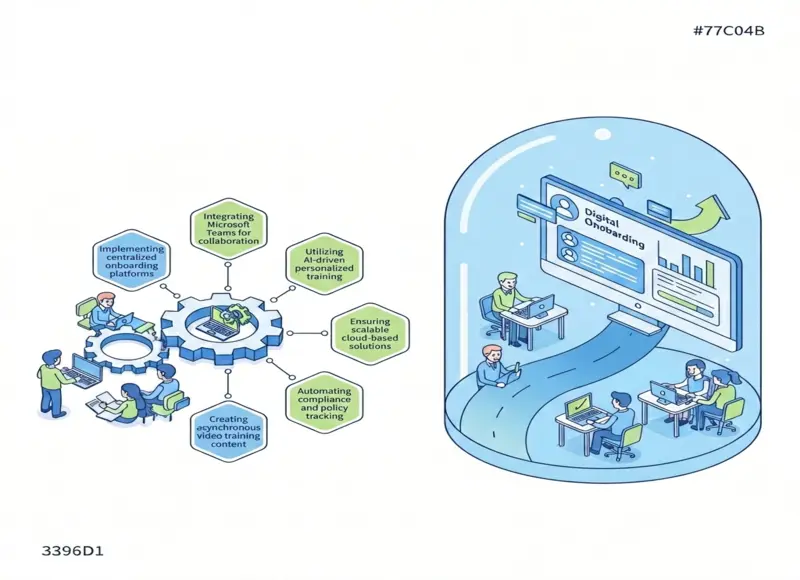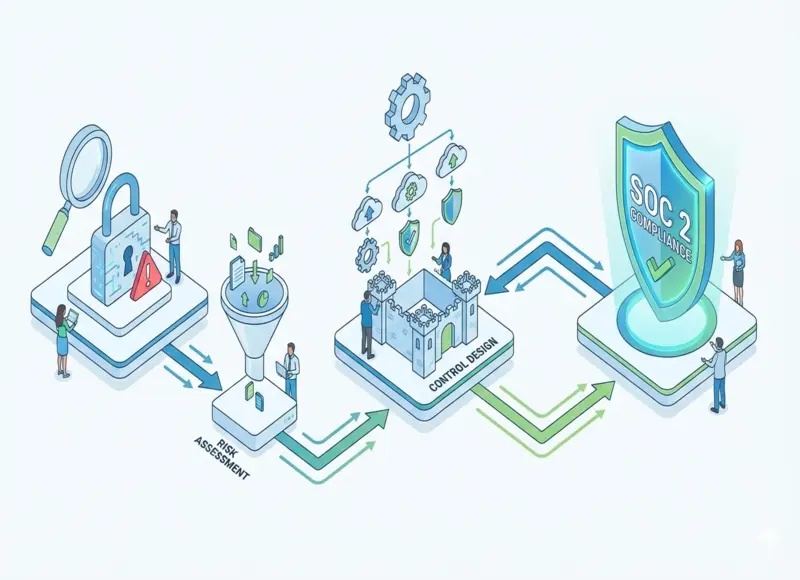Table of Contents
When it comes to choosing a financial software development company, there are several factors you should consider first. This guide helps you evaluate the best partners for your project needs.

Undoubtedly, finance and software can make or break a business. A software glitch can bring the financial system to its knees.
The market for financial software is growing rapidly, and organizations are increasingly looking for the best option. In addition, technological advancements are opening up this industry, which once was resistant and restricted. However, choosing the right financial software development company can be daunting, but it is important to keep a few things in mind.
What Is Financial Software Development?
Financial software development has become an increasingly important element of businesses over the last few years. This is due to the growing awareness of the importance of a well-informed financial system and the increasing use of electronic and mobile apps to manage finances. As a result, financial software development can help businesses create and maintain a healthy financial system, improve efficiency, and reduce costs.
Financial software development is a process of creating, testing, and deploying software to be used in financial institutions. By definition, financial software development can include anything from developing custom accounting apps to administrating a bank's vault.
In-House Development vs. Outsourcing
Software development can be divided into two types: in-house and outsourcing. Outsourcing is when a company outsources the development of a product or service, while in-house development is when a company develops its own software products. The main difference between these two types of development is that in-house development typically requires more time and money. In contrast, outsourcing usually requires less effort but can provide a higher return on investment.
Crafting a successful team from within requires tackling its unique obstacles. On the one hand, in-house developers can offer a fresh perspective and vision for new technology solutions. They can also help speed up the development process and improve your project's efficiency. But on the other hand, some drawbacks are associated with having in-house FinTech development team members on board.
However, there are many drawbacks of in-house FinTech development, including the fact that it is resource-intensive, complex, and hard to scale. Firstly, in-house teams need more experience with certain technologies. As a result, implementing new systems and processes can take time and effort.
Secondly, in-house developers may need more expertise or knowledge related to specific financial fields. This can result in frustrating slowdowns when implementing new features or fixing existing issues.
Outsourcing is a more beneficial option if done correctly. Outsourcing is more beneficial than in-house development because it allows companies to take advantage of economies of scale, leading to better performance and cost reductions. Additionally, outsourcers can shift their attention from traditional development activities such as design, coding, and testing to more innovative or cutting-edge initiatives that may be outside the purview of their original project goals.
It can be difficult for startups and early-stage companies to find qualified individuals who will contribute fully to their projects because in-house developers can be expensive and difficult to work with. This can lead to delays and increased costs due to the difficulty of getting anything done on time.
Find the Best Agency for Your Project
Connect with top-rated agencies tailored to your needs, goals, and budget.Financial IT Partner Selection Factors
There are almost 4K financial software development companies listed on Clutch. More than 62% of these companies are small businesses with fewer than 50 developers. Smaller companies have their advantages, but they may need more adequate resources if you need to scale quickly or build a big team. Approximately 35% of these companies have between 50 and 999 specialists. Only 2.1% of vendors are estimated to employ more than 1,000 specialists.
Most of these vendors are located in established outsourcing locations such as Central and Eastern Europe. Approximately 1,000 vendors in CEE are listed on Clutch, making it the leader in company numbers. In addition, Eastern Europe has the largest share of midsize (30.5% compared to 25.9% in Asia and 11% in Latin America) and large vendors (27% compared to 23.7% in Asia and 11.7% in South America).
The choice of an IT vendor shouldn't be based solely on price. From experience in the industry to reputation and capabilities - these are all important considerations when selecting a tech provider that can meet your needs.
1. Technical Expertise
The expertise of a software development company is an important consideration when selecting a partner. Hiring a company with relevant expertise in your business domain is essential if you want to develop innovative and effective software. However, not all companies have this expertise, so it is essential to carefully research which companies are trustworthy before partnering with them.
After examining the team's skills and experience, it is important to determine whether or not they overlap in areas that would benefit your project. For example, the list should include software developers with coding experience, designers, BA specialists, DevOps experts, QA specialists, and Software Architects with experience ensuring that software is functioning correctly, etc.
Your prospective IT partner should also be tuned to the current economic climate while remaining analytical and futuristic.
2. Resources Available
If the partner does not have sufficient resources, then it is likely that they will not be able to meet the expectations of the clients and may even fail. Therefore, ensure the outsourcing partner has adequate resources to provide an excellent product and meet client needs.
A good outsourcing partner should have a sufficient number of dedicated resources, including programmers, QA specialists, UI/UX designers, BA experts, etc. To gain a sense of the quality of candidates they hire, it is essential to learn about their recruitment methods and hiring strategy.
3. Security Measures
You should consider the security measures your software development partner takes to protect your data and information. Some companies may have stricter security protocols than others, so it is important to research what company will best suit your needs.
The company you hire must ensure that its security measures are excellent to protect data and information. You should also look for companies with certified staff members who are familiar with data security.
4. Risk Mitigation Plan
A software development partner must understand how to build resilience in financial institutions and knows how to identify and assess risks.
Effective risk mitigation requires understanding the profits that come with the risk and the return that can be achieved by effectively managing it and establishing yourself in the market.
5. Achievements
If you are not a financial software expert, partnering with a technology company will benefit your project.
Track records of success are important to consider before hiring an IT vendor. A company that has released successful software products is likely to be successful again and again in the future. This is especially true if the company can keep its products up-to-date with new technology and meet customer demands.
Examining their previous case studies, you can assess their expertise and success rate. Additionally, you can assess the company's credibility by researching how they hire software developers.
6. Domain Expertise
Financial fraud and money laundering cases are rising, and standards for compliance and regulation are tightening. Therefore, verifying that the IT services provider complies with regulatory requirements makes it crucial.
You should look for a partner with expertise in your field, whether it's starting from generating Cash Invoices Receipt Templates to asset management, trading, or investment. This will allow them to quickly understand the project's requirements and recommend the best solution. Besides, your prospective tech partner must have a solid understanding of financial security, such as encryption and authentication, to ensure financial data security.
A company that develops financial software must comply with regulatory requirements. Up-to-date compliance can protect the company from illegal activities and safeguard its customers' data.
7. Industry Knowledge
The best IT partner is one who is familiar with modern trends in the industry. Only by knowing the latest developments in the banking sphere will they be able to identify the weak points that need improvement and provide practical strategies. Moreover, the company should have enough expertise in development to ensure that a system can be easily customized during change and uncertainties while still meeting your business needs
8. Client Testimonials
Before deciding on a company, it is important to talk to its customers and find out what they think of it. Client testimonials represent the best source of information, providing insight into the kind of people and companies they work with and whether they feel comfortable doing business with them. In addition, communication and mutual understanding are important factors to ensure your project is on track.
9. Understanding of Business Issues
The technological landscape for businesses is rapidly changing, and more than partnering with a reputable development company may be needed. When companies face such situations, business analysts are essential in guiding them in the right direction. Business analysts use facts and figures to predict outcomes and determine the best course of action for the future, which leads to greater success probability. In many cases, companies also hire a financial analyst to complement this process by translating financial data into actionable insights that support strategic and technology-driven decisions.
A Few Takeaways
If you're seeking a financial software development company, it's important to keep the above factors in mind. You should choose the right option according to your business's goals and needs. Invest time in researching before deciding this will pay off in the long term.








